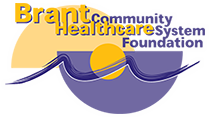12 DAYS OF GIVING ~ GRATEFUL PATIENT SPOTLIGHT
………………………………..
Ralph McKenzie grateful for care after Legionnaires Disease diagnosis
………………………………..
From the moment Ralph McKenzie arrived at the Emergency Department at the Brantford General, he felt he was receiving thorough and professional medical attention for an illness that had left him weak and tired for days.
“I had no energy whatsoever,” said Ralph, explaining he thought he was beginning to feel better on the third day of his illness, but then he started to vomit.

“I thought, ‘something’s really not right here,’” he said.
Ralph called a taxi to take him to the Emergency Department where he was immediately triaged and within 20 minutes, was connected to a vital signs monitor and administered intravenous fluids. Blood work and a chest X-ray were also ordered.
After receiving the results of the tests, Dr. Jackie Goscimski admitted Ralph as an inpatient. Though the results were not conclusive, it was suspected that Ralph may have contracted a virus, but further testing was required to determine exactly what was causing Ralph’s symptoms.
Dr. Goscimski decided to call in Dr. Verne Glavin, an Infectious Diseases Specialist, to consult on Ralph’s case.
“It was very scary,” said Ralph. “I’ve never experienced anything like that.”
A Computerized Tomography (CT) scan of his head and neck were ordered to rule out a blockage in an artery. A CT scan uses X-rays to take highly detailed cross-section images of the human body resulting in a series of image ‘slices.’ These slices each contain information that could help diagnose what was impacting Ralph’s physical health.
A second chest X-ray and a Magnetic Resonance Imaging (MRI) scan were also performed. Unlike a CT scan, an MRI uses magnetic fields and radio waves to produce its images. This technology is most commonly used for examining the brain, spine and musculoskeletal systems but is also being used more often to image the organs of the chest and abdomen.
Ralph was admitted to the care of staff on the fifth floor at the Brantford General and spent six days receiving a course of intravenous antibiotics.
He said for the first couple of days he slept most of the time as the antibiotics did their work. As he began to feel better, Ralph tried to walk as much as he could and had lots of company come to visit.
While he was a patient, Ralph said he received wonderful care.
“I can’t say enough about the staff. Everyone was wonderful, very caring,” he said. “Any questions that I had, they answered for me.”
The day after he was discharged, Ralph received a call at home from the Brant County Health Unit notifying him that he had Legionnaires Disease, a severe form of pneumonia caused by a bacterium in water. The symptoms include those that Ralph had exhibited, including shortness of breath, muscle pains, nausea and vomiting. The bacteria can contaminate water sources and spreads when a person breathes any mist that comes from the contaminated water. Though it doesn’t spread from person to person, staff at the health unit wanted to know every location he had visited recently, in order to pinpoint where the contaminated water source was located.
Ralph had been on a motorcycle trip in the eastern United States, and had taken with him his CPAP machine, a machine that provides continuous positive airway pressure to treat sleep apnea. It includes a small machine that supplies a constant and steady air pressure to help Ralph breathe properly while sleeping. Ralph said typically he uses purified water to generate the mist in his CPAP machine, but while on the trip he used tap water from the motels where he stayed.
“If I had to guess, that’s where I would suspect I got it,” he said.
Ralph also had a call from Dr. Glavin who prescribed a further two weeks of antibiotics to eliminate the infection in Ralph’s lungs.
“I had wonderful care at the hospital,” said Ralph. “From the minute I came in, everyone – from the triage nurse to the doctors and nurses in zone one, to the technicians – everyone was pleasant and very professional.”
As Ralph has learned first-hand, when crisis or illness impacts you or a loved one, the Brant Community Healthcare System is here to offer you exceptional healthcare in your time of need.
Now is the time to make a difference, please consider making a gift today that is meaningful to you, and support a strong healthcare system for our community.
Your involvement, through a donation of any size, will allow the BCHS Foundation to purchase patient equipment not funded by the Ministry of Health and Long-Term Care, provide essential resources to maintain the exceptional level of compassionate patient care, and invest in new and innovative technology.
To make a donation, visit the BCHS Foundation website at bchsysfoundation.org or call 519-751-5510.
To make a secure donation online, click here:
[maxbutton id=”12″]
For more information on how you can make a donation or offer your support to the 12 Days of Giving campaign, please contact the BCHS Foundation at 519-751-5510 or by email at foundation@bchsys.org
NOW is the time to make a difference, please consider making a gift today that is meaningful to you, and support a strong healthcare system for our community.
Thank you to our many generous sponsors!
COMMUNITY PARTNER:
SUPPORTING SPONSOR:
 |
 |
 |
 |
 |
 |
.
Please support the Brant Community Healthcare System Foundation
When crisis or illness impacts you or a loved one, the BCHS is here for you in your time of need.
Your gift today could help save a life tomorrow.




